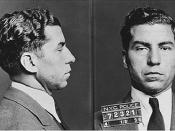"Not-so-Lucky" Macbeth
The time period of Macbeth was one in which wars and conflicts over power and land ravaged the world. In reality nearly a thousand years later much similar conflict remains. Though technology and people have evolved, certain emotions have not. In mankind there has always been a perpetual lust for power, pushing people to try to obtain it by any means possible. For example, Macbeth resorted to killing his former ally and comrade, Duncan in order to gain power which he could not have otherwise. He even proceeded to kill others who he felt posed a threat to his power, an act which would eventually lead to his own downfall. Even at the turn 20th century people felt this hunger for power, and would do anything to obtain it. In the 1920's Prohibition had taken the world of large scale crime by storm. Small organizations like street gangs began to populate America by selling illegal liquor, which in turn gave rise to larger organizations like the Mafia and the Camorra.
This new world of crime was a battlefield; very similar to the one Macbeth was on. Mafia families competed for turf, business, and, much like Macbeth, power; gang-wars raged on for months or even years, resulting in a great number of deaths and murders. Eventually though, certain individuals were able to rise to the top of the underground. One of them was the infamous mafia boss Charlie "Lucky" Luciano. Luciano was one of the most powerful mafia bosses in the 1920's rivaled in power by only a few others. He was able to make millions off of Prohibition and is thus considere3d the father of organized crime in America. In many aspects, Luciano was much like Macbeth. Their surprisingly similar sets of circumstances forged two identities which...


